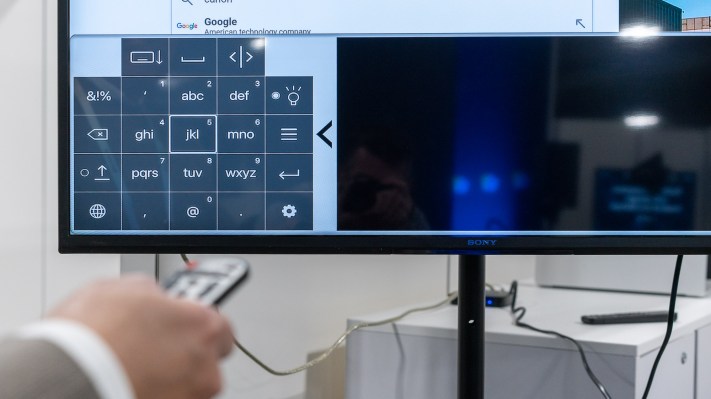This startup is trying to bring T9-like text input to your TV
Unfortunately for them, it’s a terrible, nonsensical idea

Some technologies make so much sense that they just won’t disappear. T9 — the old text input from our trusty Nokia phones from the 1990s — is one of those throwbacks. Direction 9 is a startup that is eager to introduce it to your television, so you can use the directional pad on your remote to enter text. They showed it off at CES, and… I’d be extremely surprised if it ever makes much headway.
“Entering text on your phone is hard. You have to look at your phone, two feet away, and then look at your television, 10 feet away. You have to focus up and down, and you can’t do blind typing,” explains Leon Chang, founder at Direction 9.
The company has built a prototype and added it to an Android set-top box. His vision for the company is to license the technology to “Roku or Netflix, or Apple or Samsung, think a company like that. Any kind of TV streaming company.”
I originally took a photo of the booth to share it with the rest of the TechCrunch CES team, with the caption “LOL, looks like T9 is making a comeback,” but I felt bad; surely, there had to be something I was missing? Sadly, the founder wasn’t able to make a real case for why their innovation ought to exist.
“The trend is to bring the people back to their family room. And [our technology] is easy to search or to input. There is no other solution: If you have to search for a movie or a TV show, or if you have to enter a password, this is the best solution. Nobody else could offer anything quicker, smarter, easier,” Chang says confidently. “We provide them with all the API and source code for the UI and machine code.”
Except people do offer solutions that are easier. Anyone who has tried to set up Netflix recently has realized that most screens use a “log in on your laptop and enter a code to log in on your TV” type solution, a QR code or another way to quickly log in on your device. On Apple devices, you can use the keyboard on your phone to enter passwords and logins, and on almost every modern set-top box, voice is an elegant solution for searching for the tv shows you want.
On top of all of that, any half-competent engineer could implement a version of T9 for a set-top box in an afternoon. It’s not new technology, nor is it rocket science. I’d be supremely surprised if Apple or Samsung came knocking to license this technology — especially at the price the company is hoping to charge.
“Our business model depends on who the company is, but we plan to charge $3 or $1 or $0.50 for every remote they ship,” Chang says. In a world where you can buy a Roku Express for under $40, I doubt it costs manufacturers more than $5 or so to produce a remote control at scale. It seems unlikely that they’d be willing to add 20-50% to its cost just to add a new text input as a feature.
Look, I don’t want to be a jerk to the Direction 9 team, but after 80 or so pitch deck teardowns, I’ve grown a healthy amount of skepticism regarding the startups I meet — and this one simply doesn’t hold water. Of course, I’ve been known to be wrong before, but I’d be very surprised if this company were able to find customers or investors.

